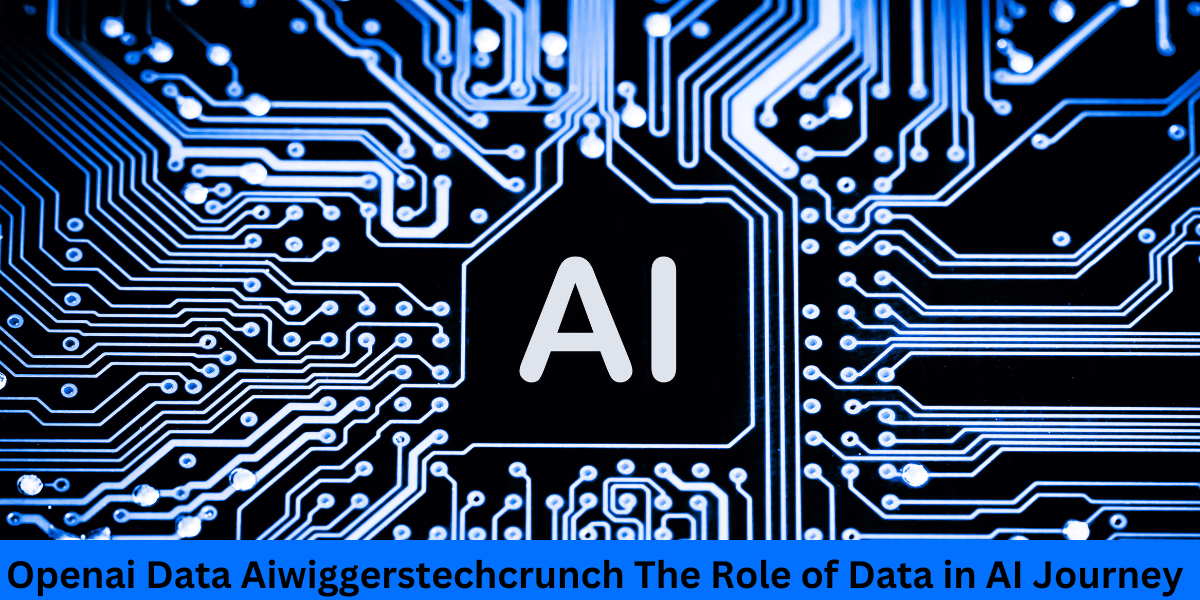Artificial Intelligence (AI) has transformed industries by leveraging massive datasets and powerful algorithms to solve complex problems. One of the key players in this revolution is OpenAI, a leader in AI innovation. This article delves into how OpenAI utilizes data, its technological advancements, and the significance of recent developments reported by TechCrunch. Openai Data Aiwiggerstechcrunch aim to provide a comprehensive analysis to help businesses and individuals understand the impact of OpenAI’s data utilization.
What is openai data aiwiggerstechcrunch Role in the AI Ecosystem?
OpenAI is a pioneer in artificial intelligence, known for creating large language models like GPT and technologies that reshape how machines interact with humans. Their focus on ethical AI development, scalability, and performance ensures their solutions meet diverse industry needs.
Key Contributions of Openai Data Aiwiggerstechcrunch
- Revolutionizing Language Models
OpenAI’s GPT series demonstrates the potential of AI to process and generate human-like text. These models are used in applications ranging from customer service to content creation. - Enhanced Machine Learning Frameworks
OpenAI’s machine learning frameworks incorporate vast datasets to improve training efficiency and model accuracy. - Ethical AI Practices
OpenAI emphasizes transparency and collaboration to address concerns around bias and misuse of AI technologies.
How OpenAI Leverages Data for AI Development
OpenAI’s success in artificial intelligence stems from its strategic approach to leveraging data for model training, fine-tuning, and deployment. The organization adopts robust methodologies to collect, preprocess, and utilize data effectively, ensuring the creation of highly efficient and reliable AI models. Below, we explore the key aspects of how OpenAI leverages data for AI development.
1. Data Collection: Building a Comprehensive Foundation
Openai Data Aiwiggerstechcrunch relies on a vast and diverse range of data sources to train its models. This ensures that its AI systems are capable of understanding and generating content across multiple domains.
- Diverse Data Sources
OpenAI collects data from publicly available text, books, research papers, and online platforms. This diversity allows the models to perform well in various contexts, such as creative writing, technical problem-solving, and conversational interactions. - Collaborative Partnerships
OpenAI collaborates with research institutions and organizations to access specialized datasets. These collaborations enrich the training material and broaden the AI’s understanding of niche topics.
2. Preprocessing: Ensuring Quality and Relevance
Before data is used for training, it undergoes extensive preprocessing to ensure it meets the required standards of quality and relevance.
- Data Cleaning
Irrelevant, outdated, or erroneous data is filtered out during preprocessing. This ensures that the models are trained on accurate and reliable information. - Normalization and Tokenization
OpenAI employs techniques like normalization and tokenization to prepare data for machine learning. These processes structure the data in a way that the AI can interpret efficiently. - Bias Mitigation
Addressing biases in datasets is a priority for OpenAI. By applying techniques such as reweighting and targeted sampling, they strive to minimize the risk of biased outputs from their models.
3. Training AI Models: Large-Scale Data Utilization
Once the data is ready, it is used to train AI models through advanced machine learning techniques.
- Massive Datasets
OpenAI trains its models on billions of data points. This scale enables the models to learn complex patterns and nuances, resulting in outputs that are both accurate and contextually appropriate. - Reinforcement Learning
OpenAI integrates reinforcement learning to improve model performance. For instance, Reinforcement Learning from Human Feedback (RLHF) is used to align AI outputs with human expectations. - Iterative Training
Training is performed iteratively, with multiple rounds of evaluation and improvement. This allows OpenAI to refine its models continuously for better accuracy and usability.
4. Fine-Tuning for Specific Applications
Openai Data Aiwiggerstechcrunch, after training, OpenAI fine-tunes its models for specific use cases. Fine-tuning involves retraining the base model on specialized datasets to optimize it for particular tasks.
- Industry-Specific Solutions
OpenAI fine-tunes its models for industries such as healthcare, finance, and education, ensuring relevance and effectiveness. - Custom AI Solutions
OpenAI works with clients to develop tailored AI models that address unique business challenges.
5. Ethical Considerations in Data Use
OpenAI is committed to ethical AI development, which includes responsible data handling practices.
- Privacy Compliance
OpenAI ensures that all data collection and usage comply with international privacy laws, such as GDPR and CCPA. - Transparency
OpenAI provides clear documentation and insights into its data practices to foster trust among users and stakeholders.
6. Challenges and Innovations
While leveraging data effectively, Openai Data Aiwiggerstechcrunch also addresses challenges such as:
- Scalability
Managing the computational resources required for large-scale training remains a technical challenge. - Data Bias
Continuous efforts are made to identify and reduce biases in training datasets. - Real-Time Data Utilization
OpenAI is innovating in the area of real-time data processing to enhance the adaptability of AI systems.
By adopting a meticulous and ethical approach to data collection, processing, and utilization, OpenAI has established itself as a leader in AI development. Its dedication to innovation ensures that its models remain at the forefront of artificial intelligence technology.
Read Also: Tabletwritings.com Blog Best Writing Tips, Tools, and Strategies
Recent OpenAI Data Updates: Insights from TechCrunch
OpenAI continues to be a driving force in artificial intelligence, with ongoing developments that enhance its capabilities and address challenges in the AI landscape. Recent updates covered by TechCrunch highlight OpenAI’s strategic innovations in data utilization, privacy safeguards, and operational scalability. These updates provide valuable insights into how Openai Data Aiwiggerstechcrunch is shaping the future of AI while maintaining its commitment to ethical practices.
1. Innovations in Data Processing and Utilization
TechCrunch reports that OpenAI is adopting cutting-edge methods to make better use of data in model training. These improvements aim to optimize performance while reducing reliance on massive datasets.
- Enhanced Algorithms
OpenAI is leveraging advanced machine learning algorithms that can extract more meaningful insights from smaller datasets. This innovation reduces the computational burden while maintaining accuracy. - Decentralized Data Processing
OpenAI is exploring decentralized approaches to data handling, such as edge computing, to process data closer to its source. This not only improves efficiency but also aligns with data privacy concerns. - Adaptive Learning
OpenAI is integrating systems capable of real-time adaptation. This allows AI models to refine their performance based on new data without extensive retraining cycles.
2. Addressing Data Privacy and Ethical Concerns With Openai Data Aiwiggerstechcrunch
One of the recurring themes in TechCrunch’s coverage is OpenAI’s proactive measures to address user concerns around data privacy and ethical AI development.
- Privacy-First Policies
OpenAI has implemented stricter compliance measures with regulations like GDPR and CCPA. This ensures that data is handled transparently and responsibly. - Anonymous Data Handling
OpenAI is adopting methods to anonymize user data during collection and processing, reducing the risk of privacy violations. - Bias Mitigation Efforts
The company continues to enhance its models by identifying and addressing biases in datasets. This involves leveraging diverse and representative datasets to reduce output disparities.
3. Collaborative Partnerships for Data Enrichment
OpenAI is expanding its reach through partnerships that allow access to unique datasets, fostering innovation while adhering to ethical standards.
- Academic Collaborations
Partnerships with universities and research institutions provide OpenAI with high-quality datasets for niche applications. - Industry Integrations
OpenAI collaborates with businesses across sectors like healthcare, finance, and education to tailor its AI solutions. These partnerships help refine datasets for specific industry needs.
4. Challenges in Data Ecosystem and OpenAI’s Solutions
Despite its successes, OpenAI faces challenges in the data ecosystem, as highlighted by TechCrunch. However, the organization is actively addressing these issues.
- Scalability of Model Training
OpenAI is optimizing its infrastructure to handle the increasing computational demands of training advanced models like GPT-4. - Data Security Risks
By implementing advanced encryption and secure data storage methods, OpenAI mitigates potential security breaches. - Environmental Concerns
OpenAI is working on reducing the carbon footprint of its large-scale training operations by adopting energy-efficient practices and investing in green data centers.
5. TechCrunch’s Vision for OpenAI’s Future
TechCrunch emphasizes OpenAI’s focus on innovation and its plans for long-term impact in the AI domain.
- AI Accessibility
OpenAI is striving to make its tools and models more accessible to developers and businesses, democratizing AI technology. - Real-Time Applications
The integration of AI into real-time systems, such as chatbots, virtual assistants, and autonomous vehicles, is a key area of growth. - Exploration of General AI
OpenAI is taking cautious yet ambitious steps toward developing General AI—systems that can perform a wide range of tasks with human-level intelligence.
Read Also: MyWirelessCoupons.com Games A Complete Guide
Applications of OpenAI’s Data-Driven Models In Openai Data Aiwiggerstechcrunch
Healthcare
AI-powered diagnostics and personalized treatments are made possible through OpenAI’s data-driven algorithms.
Finance
Predictive analytics in stock markets and fraud detection are enhanced by OpenAI’s machine learning tools.
Education
OpenAI models are revolutionizing e-learning platforms by providing personalized content delivery.
Challenges in Openai Data Aiwiggerstechcrunch’s Data Ecosystem
Despite its success, OpenAI faces challenges in data handling and model deployment:
- Bias in Data: Addressing inherent biases in training datasets is a continuous effort.
- Scalability Issues: Managing computational resources for large-scale models remains a critical challenge.
Openai Data Aiwiggerstechcrunch: Comparison of OpenAI Data Strategies vs. Competitors
| Aspect | OpenAI | Competitor A | Competitor B |
|---|---|---|---|
| Data Collection Methods | Diverse sources | Limited sources | Proprietary only |
| Privacy Measures | Advanced | Moderate | Basic |
| Model Accuracy | High | Medium | High |
| Training Scalability | Industry-leading | Moderate | Moderate |
Conclusion
OpenAI’s innovative use of data has positioned it as a leader in the AI industry. With continuous updates and a focus on ethical practices, OpenAI is redefining how businesses leverage AI for growth. The insights from TechCrunch further underscore the significance of OpenAI’s advancements in data management and model training.
FAQs
1. What makes OpenAI’s data utilization unique?
OpenAI uses diverse datasets, advanced preprocessing, and scalable training methods to achieve superior model performance.
2. How does Openai Data Aiwiggerstechcrunch data privacy?
Through strict compliance protocols and ethical AI practices, OpenAI ensures data privacy and user trust.
3. What insights did TechCrunch share about OpenAI’s data strategies?
TechCrunch highlighted OpenAI’s advancements in decentralized processing and collaborative partnerships.










